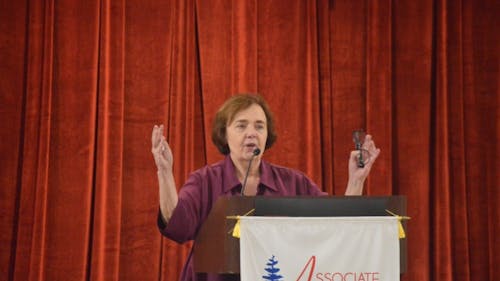Rutgers hosts women's reporter, historian Gail Collins

The New York Times columnist and women’s historian Gail Collins spoke at Trayes Hall on Tuesday night, chronicling the saga of women’s equality in America, from Martha Washington, the former first lady of the United States, to her own personal anecdotes in the newsroom of The New York Times.
Addressing a crowd of various ages, Collins started by describing a struggle emblematic of female equity in the 1960s: the right to wear slacks, a type of trousers. Slacks, she explained, were social taboo for women who were expected to wear dresses.
Meeting people around the country, Collins said she would hear women telling stories about being barred from borrowing library books if they wore pants, or being forced to wear dresses during the wintertime in Alaska. The stories, though, were not always a surprise to Collins, who experienced this practice firsthand.
“In order to sign out of the girl's dorm in slacks you had to be going bowling,” Collins said of her own experiences at her alma mater, Marquette University in Wisconsin. “I cannot tell you the millions of bowlers there allegedly were at my school.”
Other women in the audience connected to the treatment, which they also remembered as being a social norm at the time.
“I graduated in 1972 and worked for a large multinational company and we had to wear skirts every day,” said Tina Gordon, vice president of marketing and communications on the Board of the Associate Alumnae of Douglass College (AADC), which hosted the event. “If the boss wasn't in we’d sneak in, in pants. (I) remember all of those things, all the rules around women, and that wasn't only when I was in college, but it continued.”
Collins went on to tell anecdotes detailing gender inequality throughout history. Some were historical, like the underappreciation of Washington, but others more contemporary and personal, such as women needing men’s permission to get credit or the expectation that women marry out of college.
“When they were preparing for graduation, if you were engaged they gave you a little orchard,” Collins said, describing a tradition at Barnard College. “If you were not engaged they gave you a lemon.”
Collins, though, also talked about the progress women have made in society. She described the rise in graduate school applications when birth control was first introduced and that women now make up the majority of medical and law school students.
Collins attributed her own position at The New York Times to the women who came before her, who filed complaints about unequal practices in the paper.
“Those women were so happy when I got to the editorial page editor (position),” she said. “They were so happy when other women got great jobs on the paper. I never heard one of them expressing dismay it wasn't them. They were just happy that it happened.”
Above all, though, she was glad to see what she saw as a great shift in Western civilization toward female equality in society.
“God knows everything is not perfect but these opportunities and sense of fairness and equality exists all over the place,” she said. “I got to see that. I got to experience it all. I cannot tell you how proud and excited that makes me.”
In the crowd, some college students were inspired from her message of making the process easier for the next generation.
“Having women promote other women I think is really important, which she highlighted,” said Alexandra Anderson, a School of Environmental and Biological Sciences senior. “Also once you become successful yourself, bringing up other women and other people and making that path easier for the next person.”



